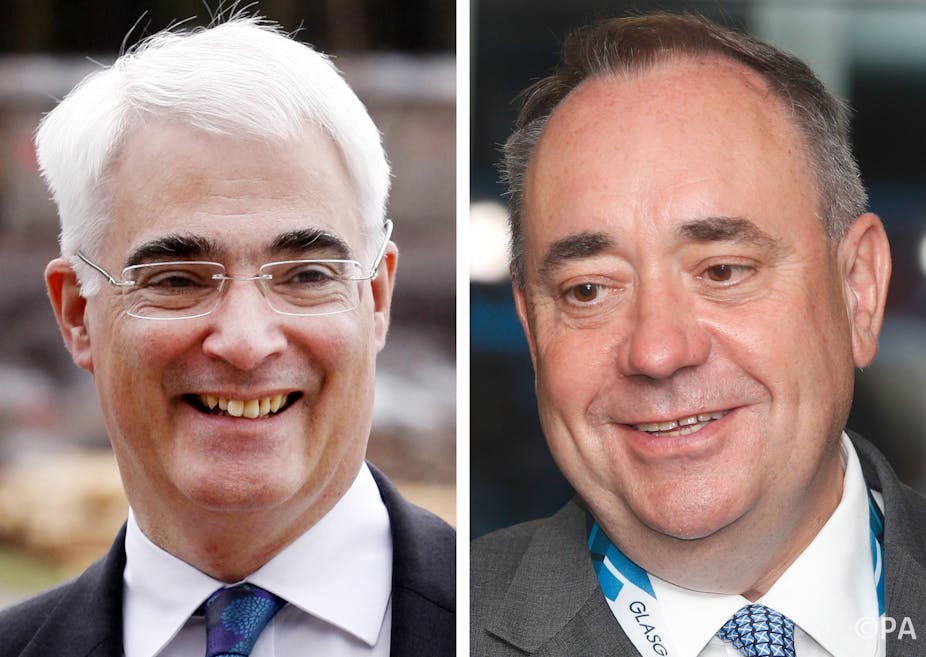Within less than an hour of last night’s second debate between Salmond and Darling, post-match analysis indicated a win for Scotland’s first minister. The polls showing the latest voting intentions will probably serve as a reminder, though, that TV debates don’t win elections. Just ask Nick Clegg.
But we’re pretty new to the pre-vote debate in the UK, and in genuinely untested waters with pre-referendum debating, where the opponents are trying to win backing for their arguments rather than themselves. In an era of big data, commentators are happy to rely on the numbers from constant polling crossed with stats from previous debates. And the polls can of course indicate how people intend to vote – often with impressive accuracy. They can even show spikes in response to certain issues.
Let the numbers, or the people talk?
But they really do not tell us too much about the complex process through which people negotiate information. During a time of such political significance, the lack of detailed investigation into why people are voting and what might shape those decisions is disappointing at best. Where is the study to complement John Curtice’s polling research or John Robertson’s pioneering content analysis? Are we happy to let the numbers do the talking, rather than the people?
From my own work, which looks at the impact of information on attitudes and behaviour, it strikes me it’s a little premature to assume these TV debates don’t have any impact –- although that is a long way from saying they simply change minds. At the most basic level, we are in the last stages of a long campaign, and a good chunk of the Scottish electorate already has entrenched views. Many people are watching the debates for simple entertainment –- screaming from the touchline of social media.
But what of those who are a little more interesting –- the “undecideds”? The response of this group, likely to include the deepest of thinkers, must be contextualised within today’s information-intense multimedia environment. For every argument they’ve heard, there is a counter-argument. For every bit of evidence, more evidence to refute what they’ve just been told. Expert versus expert. Sadly disengagement is a common response to information overload – and some may choose simply not to vote. But other factors can be important too.
Constant repetition is key
In what might seem like bad news for Alex Salmond, our research has shown that prior exposure to media messages makes a difference – in other words, the constant reinforcement of the uncertainty on the future currency could limit the power of any alternative argument at this point. Stale though this strategy seemed in last night’s debate, the Better Together campaign for staying in the union will understand that it must continue to pursue it. On the other hand, if the original impression was that this is simply Westminster bullying, that impression might well be reinforced too.
A second factor is the way that credibility is attributed to the speaker – this is a tough one, as research consistently shows that politicians are the least trusted group of all. And the mainstream media fares less well these days. But this is where social media comes in – again our research indicates that in terms of decision-making on pronouncements in the mainstream, increasingly people turn to their trusty band of online friends and followers. If the information presented is considered credible by their group, it is likely to carry more weight.
Media-savvy Scots
Credibility of information though is not the only factor. It is often repeated that it doesn’t really matter who performs better in these debates because we’re not actually voting for either man – and who’d make such a historic decision on the basis of whether you like or dislike those arguing for or against it?
The media-savvy Scottish electorate get this, I think – they know they are not voting for an individual as you might in a general election. But many will also take the wholly rational stance that Salmond at least must convince that he is up to job of successfully protecting the interests of the Scottish people.
The short-term negotiations following a Yes vote are likely to impact on pensions, the health service and –- dare I say it –- the currency. Strength of character is likely to be a key factor in this respect, and some might even be willing to overlook a few political differences if Salmond is seen to be the man to pull it off.
But there are a whole host of factors in which people assess the information that is presented to them – and how TV debates like this might or might not impact on the vote. But for now we’ll just have to wait until September 18th for the full answer.

